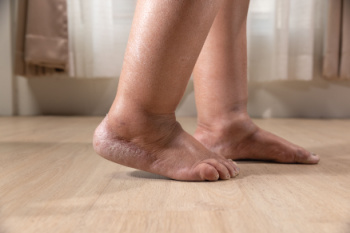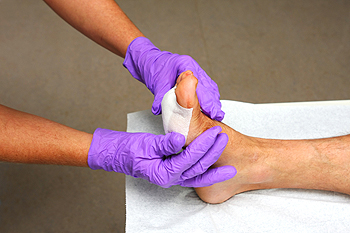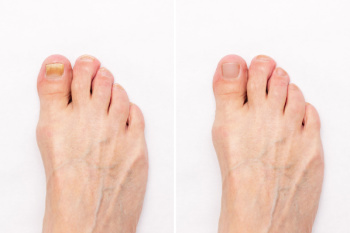Connect With Us
Blog

Swollen ankles are often caused by a buildup of fluid in the soft tissues, known as edema. This can develop for many reasons, including standing or sitting in one position for too long, consuming high amounts of salt, being overweight, pregnancy, or taking certain medications. Swollen ankles may also result from an ankle sprain, infection, insect bite, or more serious conditions involving the heart, kidneys, or liver. Symptoms can include puffiness around the ankles and feet, shiny or stretched skin, skin discoloration, and discomfort or stiffness. In some cases, pressing the skin may leave a dent. A podiatrist can perform a detailed exam to determine whether the swelling is linked to an injury, circulation problem, or another medical condition. Depending on the cause, treatment may involve reducing inflammation, draining excess fluid, prescribing medication, or correcting biomechanical issues with the foot or ankle. In severe or persistent cases, surgery may be recommended to resolve structural or vascular concerns. If you have swollen ankles, it is suggested that you schedule an appointment with a podiatrist for an exam, diagnosis, and appropriate treatment.
Swollen feet can be a sign of an underlying condition. If you have any concerns, contact David Mansky, DPM of Mansky Podiatry. Our doctor can provide the care you need to keep you pain-free and on your feet.
Swollen feet are a common ailment among pregnant women and people who stand or sit for extended periods. Aging may increase the possibility of swollen feet and patients who are obese often notice when their feet are swelling too. There may be medical reasons why swollen feet occur:
- Phlebitis - A condition that causes the veins to become inflamed and can also cause leg pain.
- Liver disease - This may lead to low blood levels of albumin which is a protein. This can cause fluid in the blood to pass into the tissues and several areas of the body can become swollen.
- Heart failure - When the heart doesn’t pump properly the blood that is normally pumped back to the heart can pool in the veins of the legs causing swollen feet.
- Kidney disease - One of the main functions of the kidneys is releasing excess fluid in the body. This type of condition can make it difficult for the kidneys to function properly, and as a result the feet may become swollen.
- Deep-vein thrombosis (DVT)- This is a serious condition where blood clots form in the veins of the legs. They can block the return of blood from the legs to the heart which may cause the feet to swell. It is important to be treated by a podiatrist if this condition is present.
Swollen feet can also be caused by bone and tendon conditions, including fractures, arthritis, and tendinitis. Additionally, there may be skin and toenail conditions and an infection may cause the feet to swell. Patients who take medicine to treat high blood pressure may be prone to getting swollen feet.
Many patients elevate their feet to help relieve the swelling and this is generally a temporary remedy. When a podiatrist is consulted the reason behind the swelling can be uncovered and subsequently treated.
If you have any questions please feel free to contact our office located in Hastings, MI . We offer the newest diagnostic tools and technology to treat your foot and ankle needs.

Debridement is the process of removing dead or infected tissue from foot wounds or ulcers to help the body restart the healing process. When unhealthy tissue is present, it can delay healing and increase the risk of infection. By clearing out this tissue, debridement encourages the growth of healthy skin, reduces the chance of complications, and may minimize long-term scarring. There are several types of debridement, including enzymatic, autolytic, mechanical, and sharp methods. The method chosen often depends on the severity and condition of the wound, as well as a patient’s overall health. In some cases, surgery may be required, particularly for deep or severely infected wounds that do not respond to conservative options. A podiatrist can evaluate the wound and determine the most effective way to promote healing. Podiatrists are trained to manage foot, toe, and ankle wounds safely and effectively, and they provide continued monitoring throughout recovery to help prevent further issues. If you have foot wounds or ulcers that are not healing properly, it is suggested that you schedule an appointment with a podiatrist for an exam and ongoing wound care.
Wound care is an important part in dealing with diabetes. If you have diabetes and a foot wound or would like more information about wound care for diabetics, consult with David Mansky, DPM from Mansky Podiatry. Our doctor will assess your condition and provide you with quality foot and ankle treatment.
What Is Wound Care?
Wound care is the practice of taking proper care of a wound. This can range from the smallest to the largest of wounds. While everyone can benefit from proper wound care, it is much more important for diabetics. Diabetics often suffer from poor blood circulation which causes wounds to heal much slower than they would in a non-diabetic.
What Is the Importance of Wound Care?
While it may not seem apparent with small ulcers on the foot, for diabetics, any size ulcer can become infected. Diabetics often also suffer from neuropathy, or nerve loss. This means they might not even feel when they have an ulcer on their foot. If the wound becomes severely infected, amputation may be necessary. Therefore, it is of the upmost importance to properly care for any and all foot wounds.
How to Care for Wounds
The best way to care for foot wounds is to prevent them. For diabetics, this means daily inspections of the feet for any signs of abnormalities or ulcers. It is also recommended to see a podiatrist several times a year for a foot inspection. If you do have an ulcer, run the wound under water to clear dirt from the wound; then apply antibiotic ointment to the wound and cover with a bandage. Bandages should be changed daily and keeping pressure off the wound is smart. It is advised to see a podiatrist, who can keep an eye on it.
If you have any questions, please feel free to contact our office located in Hastings, MI . We offer the newest diagnostic and treatment technologies for all your foot care needs.

White superficial onychomycosis is a fungal infection that affects the surface of the nail, causing white, powdery patches that may spread over time. Symptoms include brittle, rough, and discolored nails that become weak and prone to breaking. Other types of fungal nail infections include distal subungual onychomycosis, which starts at the tip of the nail and spreads underneath, often leading to thickening and yellowing. Proximal subungual onychomycosis begins near the cuticle and moves outward, commonly seen in individuals with weakened immune systems. Chronic mucocutaneous candidiasis is a persistent fungal infection caused by Candida, affecting both nails and surrounding skin, leading to thickened, discolored nails. If you have symptoms of toenail fungus, it is suggested that you contact a podiatrist who can offer appropriate treatment solutions.
For more information about treatment, contact David Mansky, DPM of Mansky Podiatry. Our doctor can provide the care you need to keep you pain-free and on your feet.
Toenail Fungus Treatment
Toenail fungus is a condition that affects many people and can be especially hard to get rid of. Fortunately, there are several methods to go about treating and avoiding it.
Antifungals & Deterrence
Oral antifungal medicine has been shown to be effective in many cases. It is important to consult with a podiatrist to determine the proper regiment for you, or potentially explore other options.
Applying foot powder on the feet and shoes helps keep the feet free of moisture and sweat.
Sandals or open toed shoes – Wearing these will allow air movement and help keep feet dry. They also expose your feet to light, which fungus cannot tolerate. Socks with moisture wicking material also help as well.
If you have any questions please feel free to contact our office located in Hastings, MI . We offer the newest diagnostic tools and technology to treat your foot and ankle needs.
Blog Archives
- April 2025
- March 2025
- February 2025
- January 2025
- December 2024
- November 2024
- October 2024
- September 2024
- August 2024
- July 2024
- June 2024
- May 2024
- April 2024
- March 2024
- February 2024
- January 2024
- December 2023
- November 2023
- October 2023
- September 2023
- August 2023
- July 2023
- June 2023
- May 2023
- April 2023
- March 2023
- February 2023
- January 2023
- December 2022
- November 2022
- October 2022
- September 2022
- August 2022
- July 2022
- June 2022
- May 2022

